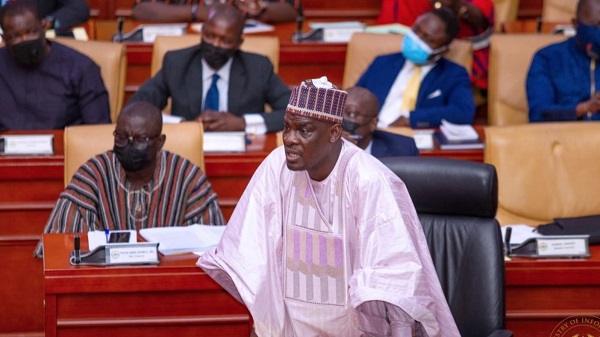Haruna Iddrisu, Minority Leader, says Parliament has contributed to the country’s current economic crisis.
He said Parliament had failed in its oversight responsibility of the government’s excessive borrowing, which had increased the debt stock beyond 100 per cent of the Gross Domestic Product.
Mr Iddrisu said this when the Ministry of Parliamentary Affairs (MoPA) engaged the core leadership of Parliament and other key functionaries to deliberate on Parliament and Ghana’s democratic dividend in Accra on Tuesday.
The meeting was on the theme: “Parliament and the Harnessing of Democratic Dividend: An Assessment,” was part of the Ministry’s capacity-building efforts to support the enhancement of the ability of Parliament in a functioning democracy.
It had the objectives that core leadership and other functionaries would be engaged to stimulate discussions on Ghana’s democratic dividend and examine the extent to which the Parliament of Ghana had ensured the responsibility of government to the needs and concerns of citizens.
It was also to identify challenges hampering the effective and efficient performance of Parliament and propose measures to enhance the effectiveness and efficiency in the discharge of its core responsibilities.
It was expected that a report consolidating the views on Ghana’s Parliament and democratic dividend would be developed at the end of the engagement and subjected to an impact assessment to facilitate future training programmes of the Ministry.
Mr Iddrisu noted that Parliament’s role in defending the public’s interest had deteriorated.
“Parliament’s role as the defender of the people’s interest is lost. So how did we get here, how come we didn’t anticipate it? It is only Parliament that approves the terms and conditions of the loan. So, if we have exceeded 100 per cent of GDP, how did it happen?”
According to him, Parliament had become a clearing house for the executive without proper scrutiny of government policies.
On his part, Mr Osei Kyei-Mensah-Bonsu, Minister MoPA and Leader of Government Business Parliament, said the appreciation of the cedi had contributed to the reduction of the country’s debt stock by about 40 billion cedis.
“You know that the appreciation of the cedi now has brought the debt stock down even though nothing has been done. It has climbed down by close to 40 billion and it will still climb down if the cedi continues to appreciate against the dollar,” he said.
Mr Kyei-Mensah-Bonsu also urged Members of Parliament to strengthen committees in the House to improve their work.
Dr Maame Adwoa Gyeke-Jandoh, University of Ghana, Department of Political Science, said Ghana must stick to its current democratic system despite the challenges.
She said despite the bottlenecks, Ghana was enjoying democratic dividends of peace, stability, and political inclusion.
Dr Gyeke-Jandoh, however, said smaller political parties must be involved in the democratic dispensation of the country, tackle corruption, have transparent governance, strong parliament with professional legislators, and complete separation of power with progressive gender equity.
Mr Yaw Boadu Ayeboafo, Chairman, National Media Commission, said public thinking and the thinking of parliament were incongruous.
He expressed dissatisfaction when political leaders were part of the speaker’s advisory body.
“I am bothered about policies passed by the president but not bothered about who is elected as president. There is no Ghanaian happy about the economic problems the country is facing,” he said.
Mr James Klutse Avedzi, Deputy Minority Leader, said Parliament had been weakened due to the rubber-stamping work they were performing on behalf of the executive.
He said that practice had made the public lose confidence in the House.
Mr Cyril Nsiah, Clerk to Parliament, said Parliament was working towards strengthening the institution of Parliament.
The engagement had a delegation from the Ministry of Parliamentary Affairs led by Mr Kyei-Mensah-Bonsu with support from the Chief Director, management and staff, the core leadership of Parliament, Chair and Ranking Members of the Committees of Constitutional, Legal and Parliamentary Affairs, Subsidiary Legislation, Special Budget and Finance, representatives from the Ministry of Finance and Ministerial Advisory Board Members of MoPA.





